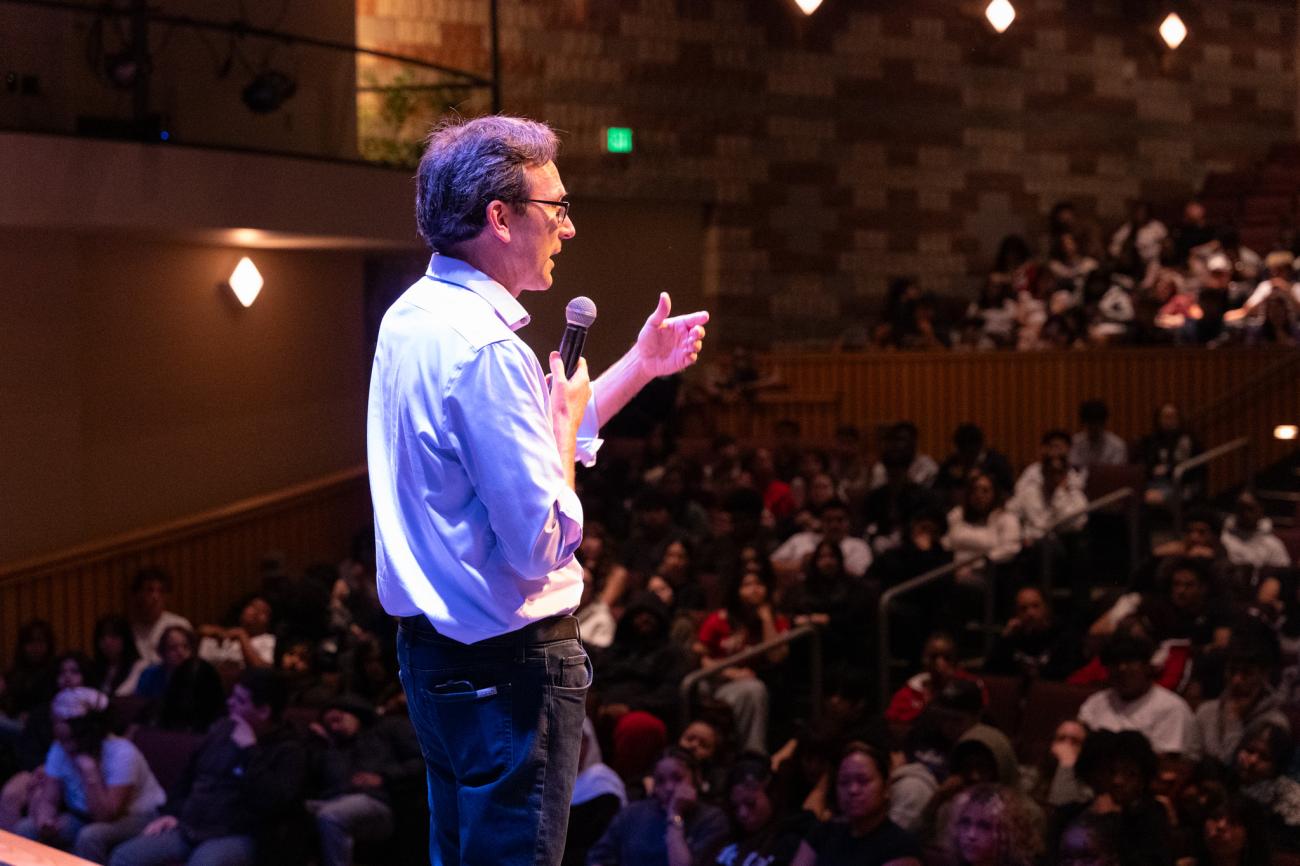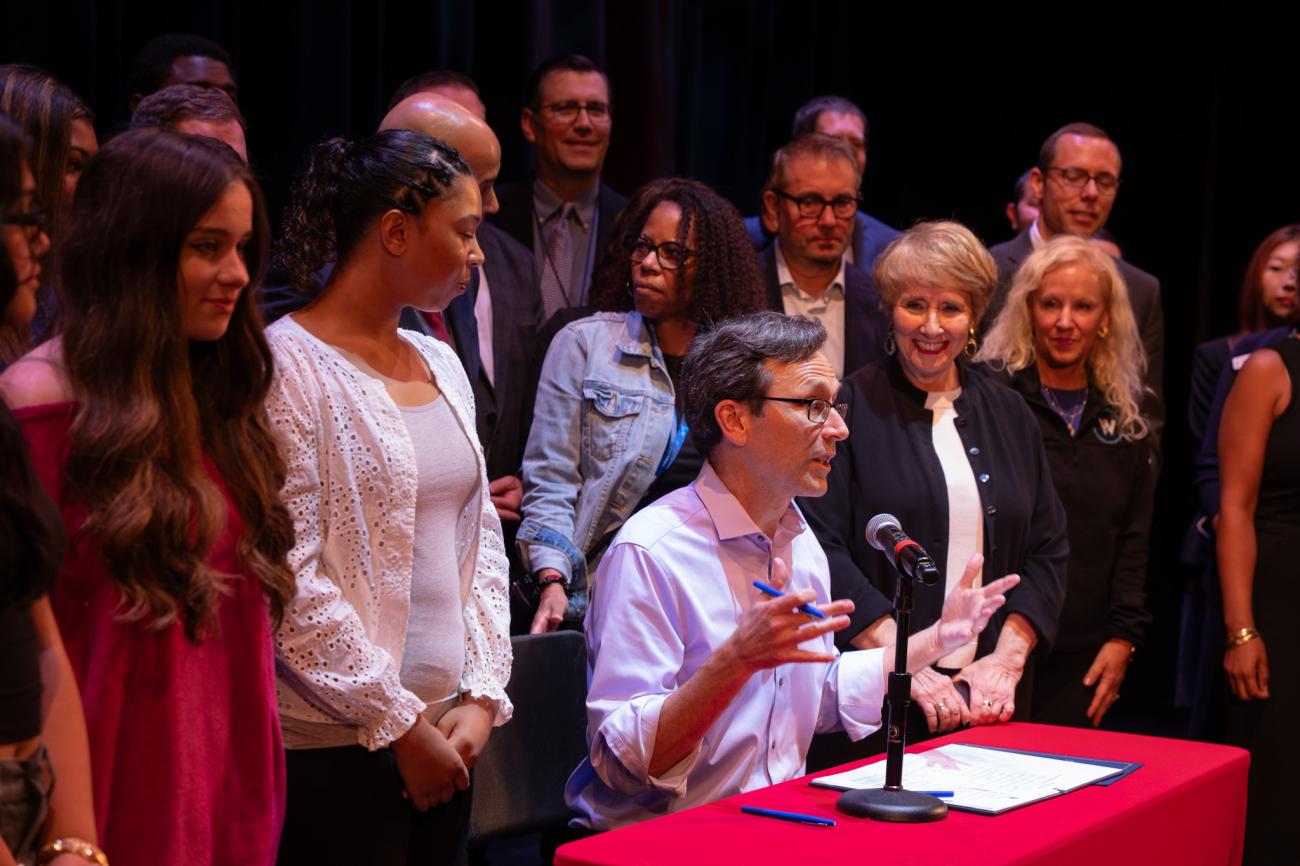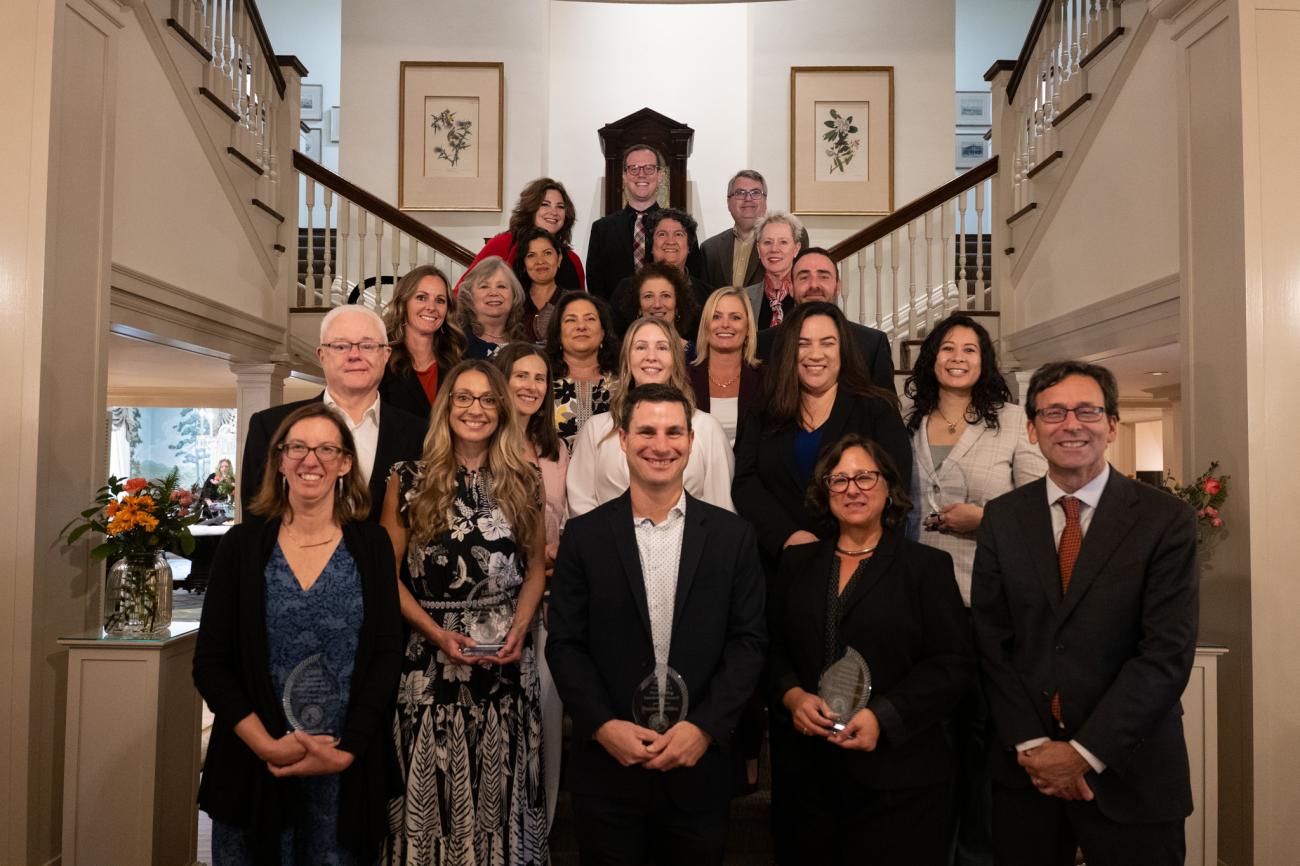OLYMPIA — Governor Bob Ferguson honored 24 dedicated public servants with the Governor’s Outstanding Leadership Awards today at the Governor’s Mansion.
The honorees include managers from multiple state agencies and the University of Washington and Washington State University. The awards were created in 1985 by Governor Booth Gardner.
“Washington’s dedicated public employees are the backbone of state government,” Governor Ferguson said. “They teach at our colleges and universities, operate our ferries and plow snow off our roads, inspect food for safety, provide skilled care to people in our veterans’ homes and behavioral health facilities, supervise individuals detained in corrections institutions, protect our highways, and so much more. They are often unsung heroes, responsible for our state’s many successes. Especially in these trying times, they shoulder many challenges. I’m proud to work alongside all of them every day. While we honor just a few today, know that I am thankful for all of their work.”
The Governor’s Outstanding Leadership Awards honor exceptional managers who exemplify excellence in their performance and accomplishments. They demonstrate the leadership competencies that Washington state needs to embed a performance-driven culture and model the values and behaviors that promote a diverse and inclusive workforce.
This year’s honorees
Andrea Nygard — Department of Licensing
Andrea Nygard was tasked with creating a brand-new program to provide payments to farm fuel users — an enormous challenge that had to be designed, tested and launched in less than six months. With vision and collaboration, she built a team, partnered with industry and farming groups, and ensured the program was practical, secure and accessible, even translating materials into multiple languages. Since launch, it has delivered more than $6 million in payments to Washington’s farmers. She accomplished all of this while continuing to lead a team of 30, managing critical statewide licensing and regulatory programs.
Ann Martin — Department of Social and Health Services
For over 35 years, Ann Martin has been a tireless advocate for people with disabilities. Her vision and dedication have transformed vocational rehabilitation in Washington, helping countless individuals achieve life-changing employment and giving our state one of the highest employment rates for people with intellectual and developmental disabilities. Ann has led with integrity and innovation — embedding “Motivational Interviewing” into practice, championing person-centered approaches, and mentoring staff to grow their skills and confidence. Known for her listening, collaboration and unwavering belief in the potential of every person, Ann has built trust, inspired teams and created lasting opportunities that truly change lives.
Autumn Witten — Department of Corrections
Autumn Witten is a visionary leader who transformed Washington’s community corrections system. They guided the successful implementation of sweeping legislative reforms — modernizing policy, training and technology — while centering equity and accountability. Their leadership has reduced recidivism, saved millions in taxpayer dollars and strengthened public safety. Dell-Autumn’s strategic foresight and steadfast integrity have reshaped community supervision and improved countless lives.
Bea Hart — Department of Labor & Industries
Bea Hart serves as L&I’s Region 1 Administrator, leading 19 customer service offices statewide that assisted more than 250,000 people last year. Recognizing the challenges customers faced, Bea created the Customer In-Person Appointment Program, saving hundreds of hours of staff and customer time and preventing unnecessary travel. It is now being expanded statewide with significant budget savings. She also championed equity by ensuring outreach served non-English-speaking customers and leading the Certified Interpreter Pilot Project. A true servant leader, Bea invests in staff growth through leadership training, de-escalation tools and new career pathways, all while building a culture of respect, inclusion and customer focus. Her leadership has transformed both the customer experience and the workplace environment.
Brian Tinney — Office of Financial Management
Since 2015, Brian Tinney has served as Washington’s Statewide Accounting Director, ensuring accuracy, transparency, and public trust in state financial reporting. He has been a key leader in the One Washington transformation, guiding the move to a modern, cloud-based financial system that will serve as a lasting legacy for state government. Brian is also known for his commitment to equity and inclusion, creating space for meaningful dialogue and ensuring every voice is heard. With empathy, professionalism and integrity, he builds trust, fosters collaboration and leads with both technical expertise and genuine care for people. Brian exemplifies what it means to be a model public servant.
Bryan Templeton — Department of Labor & Industries
Bryan Templeton’s leadership has delivered historic results for Washington workers. Under his guidance, one investigation secured an $11.5 million settlement for Boeing employees — the largest in agency history — and another returned lost wages to 15,000 Lyft drivers. From 2022 to 2024, his team resolved more than 25,000 complaints and recovered over $6 million in wages and penalties, advancing fair labor standards across the state. Bryan leads with integrity, collaboration, and a strong commitment to equity —expanding access by translating materials into 15 languages and building a diverse, inclusive team. Trusted, approachable and results-driven, Bryan has built a culture of fairness, accountability and care that has made a lasting impact on both workers and colleagues alike.
Catherine Woodard — Department of Health
Catherine Woodard has devoted nearly 50 years to public service, including more than 30 years in law enforcement and 18 years with the Washington State Board of Nursing. A nationally recognized leader in nursing regulation, she has advanced fair, balanced and compassionate approaches that protect the public while supporting nurses. Catherine has led critical initiatives — from ensuring timely licensure during COVID to partnering with the FBI on Operation Nightingale, and most recently embedding equity and accountability into disciplinary processes. Her groundbreaking work to address bias in nursing regulation will soon be published nationally. Known for her humor, optimism and servant leadership, Catherine uplifts colleagues, mentors future leaders and inspires excellence at every turn.
Connie Minton — Department of Social & Health Services
Connie Minton has dedicated more than 40 years to public service, becoming a trusted leader and subject matter expert in reasonable accommodation and leave management. She not only transformed how cases are managed through the development of the Reasonable Accommodation Information System but also generously shares her expertise statewide — mentoring, consulting and training thousands to create more equitable workplaces. Connie’s leadership is both strategic and deeply human: she builds fair, transparent processes that protect rights and reduce risk, while fostering compassion, trust and inclusion. A true servant leader, Connie uplifts her team, empowers future leaders and has left a lasting mark on the field of reasonable accommodation across Washington.
Daniel Zeitlin — Employment Security Department
Dan Zeitlin has been a driving force in strengthening economic security for Washingtonians. As Chief of Staff, he led the nation in delivering $21.7 billion in pandemic unemployment benefits and expanded equitable access to services, including for transportation network drivers. Dan’s dedication to diversity, equity and inclusion shines through his policy work, mentoring and commitment to authentic collaboration. He is a trusted leader who credits success to his team while building partnerships that advance the agency’s mission.
Gina Legaz — Department of Health
Gina Legaz has brought results-based accountability to the heart of public health. In less than three years, she has united teams around meaningful measures that reveal the true impact of investments and policies, especially for marginalized communities. Gina leads with clarity, compassion and equity, mentoring others and fostering collaboration across silos. Her work is ushering in a culture of transparency, performance and purpose that elevates public health outcomes statewide.
Jessica Todorovich — Department of Health
Jessica Todorovich has led her agency through one of its most challenging periods with vision, authenticity and hope. By centering trust, collaboration and transparency, she rebuilt relationships with staff, partners and legislators, fostering a renewed spirit of connection and teamwork. Jessica champions equity through personal accountability and bold investments like the Employee Experience Program, which supports staff growth and well-being. Her steady leadership has inspired a culture where people feel valued, supported and ready to thrive.
Kara Lowe — Washington State Charter School Commission
Kara Lowe is a transformational leader whose work has embedded equity and inclusion into every facet of her agency. She has cultivated a culture of care, transparency and collaboration, empowering staff and elevating the voices of marginalized communities. Her authentic partnerships and clear communication have driven meaningful policy advances and strengthened services for those most in need. Kara’s leadership has not only improved her agency — it has set a new standard for equity-centered public service.
Kara Withers — Department of Corrections
Kara Withers has built a groundbreaking leadership development program at the Department of Corrections, creating opportunities for over 1,500 employees in just three years. She has championed mentorship, inclusive training and women’s leadership initiatives, all without a dedicated budget. Kara’s innovative approach strengthens leaders across the agency, builds equity into every level, and preserves essential knowledge for the future. Her work is now a model for other states, proving the power of small teams with big vision.
Karen Peterson — Department of Labor & Industries
Karen Peterson’s nearly 40 years of public service have been defined by thoughtful strategy, steady guidance and a passion for improving how government serves people. She has led dozens of initiatives modernizing systems, expanding services and fostering collaboration across teams and partners. Karen’s equity-minded leadership and mentorship have empowered staff and delivered measurable results that benefit workers, employers and communities alike. She exemplifies the quiet power of service-driven leadership that endures and inspires.
Kate Litle — University of Washington
Kate Litle has dedicated nearly 15 years to strengthening Washington’s coast through strategic vision, inclusive practices and steadfast care for her team. Under her leadership, programs have generated over $190 million in benefits, advanced science and sustainability, and supported vibrant coastal communities. Kate’s focus on equity, mentorship and respectful dialogue has fostered a workplace where all voices are valued and staff feel empowered. She is a steady, trusted leader whose impact is felt across the state.
Lauren Jenks — Department of Health
Lauren Jenks has transformed environmental public health by aligning technical excellence with equity and community voice. She has led the integration of environmental justice, climate resilience and inclusive governance into policy and practice, while nurturing the next generation of diverse leaders. Lauren’s relational approach and clear communication have strengthened partnerships, improved staff morale and elevated those historically excluded from decision-making. Her equity-centered leadership has positioned her division to create lasting, people-focused change.
Lenny Young — Department of Natural Resources
With more than 35 years of service, Lenny Young has provided steady, people-centered leadership. As deputy chief operating officer of a 2,200-person agency, he’s championed DEI initiatives, strengthened wildfire investigations, and cut safety incidents by more than half, all while guiding staff through historic events from major rulemaking to the Oso landslide. Lenny bridges field, office and executive teams with clarity and care — leaving a lasting legacy of integrity, inclusion and public service.
Lichiou Lee — Office of the Insurance Commissioner
As chief actuary at the Office of the Insurance Commissioner, Lichiou Lee blended technical excellence with compassion. Since 1995, she’s ensured fair, data-driven insurance rates, challenged inequitable pricing and helped Washington lead nationally on equity in insurance. A gifted mentor and communicator, Lichiou created space for learning and respect while safeguarding consumers through rigorous, thoughtful policy work. Lichiou retired recently after 30 years of state service.
Lonnie Peterson — Department of Health
Lonnie Peterson’s visionary leadership launched Washington’s 988 Suicide & Crisis Lifeline, transforming a fragmented system into a trusted, statewide network. She championed equity through initiatives like the Native & Strong Lifeline, all while fostering a resilient, supportive team that consistently meets high-stakes goals. Lonnie’s blend of strategy, empathy and collaboration has expanded lifesaving access to mental health support across the state.
Matthew Jeffries — Washington State University
At Washington State University, Matthew Jeffries has elevated accessibility and inclusion through bold leadership of the Student Accommodation and Disability Resource Center. He streamlined services, modernized policies and built a culture where every student and staff member feels valued. Matthew’s integrity, vision and commitment to equity have reshaped how the university supports students with disabilities — and strengthened opportunity for all.
Melissa Weitzel — Department of Veterans Affairs
Melissa Weitzel has transformed transitional housing for Washington’s veterans. Growing the program to 135 beds, she’s helped hundreds move into permanent homes, launched medical recuperative care and modernized facilities with dignity in mind. Through partnerships, equity-focused initiatives and steady guidance during challenges, Melissa ensures veterans receive not just housing but comprehensive, compassionate support.
Patrick Niles — Washington Military Department
Patrick Niles has revolutionized emergency preparedness training in Washington. As state training officer, he expanded annual courses from 200 to nearly 700, reaching over 11,000 participants — including robust Tribal programs. Patrick’s strategic planning, inclusive outreach and collaborative style have strengthened statewide resilience and built a culture where every community has the tools to face future emergencies.
Tatjana Roberts — Employment Security Department
Tatjana Roberts has redefined leadership development in their division, creating a thriving academy for staff at all levels and embedding equity into hiring and culture. By streamlining services, mentoring talent and fostering open communication, Tatjana has delivered measurable operational gains while nurturing a workplace built on inclusion, accountability and teamwork.
Tienney Milnor — Attorney General’s Office
Tasked with launching the Attorney General’s Organized Retail Crime Team, Tienney Milnor has built a high-performing unit from the ground up. She forged statewide partnerships, set smart prosecution standards and created a collaborative, equity-focused culture that tackles major retail theft with efficiency and fairness. Tienney’s dedication and steady leadership have positioned Washington as a model for combating organized retail crime.





